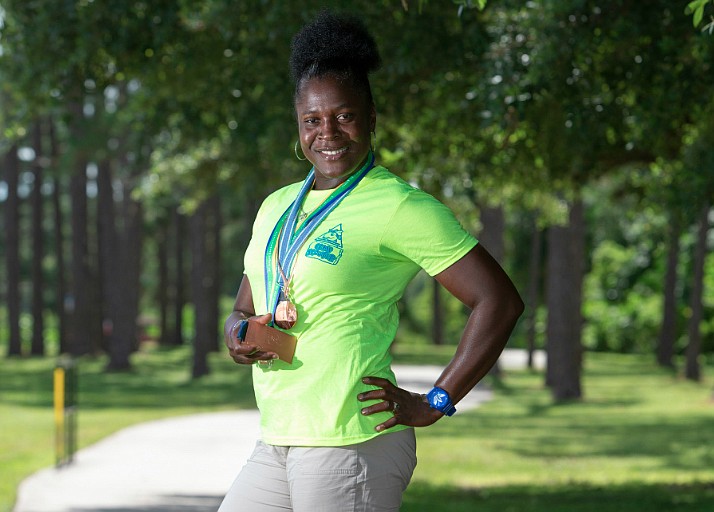- April 18, 2024
-
-
Loading

Loading

You could say Delloreen Ennis’ track career began when she headed to Abilene Christian University on a full track scholarship in 1995.
But for Ennis, an Ocoee resident and native of Jamaica, her love of running truly started when she was a child growing up in Jamaica, racing her friends to the shop to get groceries for their parents.
Ennis, 43, is a retired hurdling athlete who has competed in three Olympic Games and four World Championships. Additionally, she’s the only athlete to win all eight short-hurdle NCAA titles — 55-meter indoors and 100-meter outdoors, four times each — in a career.
Now, five years into retirement, Ennis has channeled her passion into a new role as a recreational specialist for Orange County.
Ennis was born and raised in Jamaica, and she and her friends constantly turned running errands for their parents into competitions.
“Growing up in my country we pretty much ran to most places,” she said. “It’s fun for us, and the kids have competitions where we’d try to run to see who could make it to the shop (and back) the fastest. That’s how it started — running places, getting together with the kids at the time in our district and just having fun. We played soccer, we ran around, just different stuff.”
Her love of running grew as she transitioned from middle to high school in Jamaica. Coaches at the high school saw her talent and pushed her to work hard and improve at her craft. The fruits of her labor were rewarded with a full track scholarship to ACU in 1995. It was the first time she left home, and she spent a lot of time there in Texas during her career
“My major was business management, and that’s what I got my degree in in four years,” she said. “As track athletes, we normally get an extra year, but I accomplished all of my classes in four years. I was the only one in my family who went to college, as well, so I wanted to make them proud. Being away from home I didn’t want to get caught up and get distracted, so I was very focused and knew what I was up against.”
Her collegiate career was a successful one: She won a total of eight NCAA short-hurdle championships in her four years and also holds the record in the100-meter hurdle for ACU. After attending the meets, getting exposure and knowing she was successfully competing against top athletes, she saw another opportunity ahead of her — the Olympics.
Ennis went back home to Jamaica and competed in the Olympic trials there, finishing in the top three and punching her ticket to the Olympics three times — Sydney in 2000, Athens in 2004 and Beijing in 2008.
“My first Olympics, I made it to all my finals, and that was big for me, because you’re competing against the world, but I would finish in fourth (in the final),” she said. “I (was) always very close to getting a medal, but it’s so devastating, especially at the last one I competed in in Beijing. I was so close to being in second position, but we were all running at that last hurdle to the finish line, and I kind of twisted my body outside the line so I ended up finishing fifth in the final. That was very hard for me, because that was the moment, I was competing really good that year, and I was so close but ended up walking away without a medal.”
Aside from the Olympics, Ennis also competed in four World Championships. She won bronze medals in 2007 and 2009 and a silver in 2005.
“It’s all about coming together and competing for your country: When you put on that uniform, you’re very proud to know that you’re out there for your country,” she said.
The training to maintain her body during her professional career was rigorous — sometimes up to five hours a day, seven days a week — but it was worth it.
“It takes a lot of dedication and focus, and a lot of hard work,”she said. “The way my schedule was normally set up in terms of my training regimen, I would get up about 8 a.m. and make sure I had my breakfast, and go to the track around 10 a.m. I would be there until 1 or maybe 2 p.m. some days, because ... I had to go to the gym right after that. You’re looking at maybe three to four hours, then getting a massage and getting an ice bath.
“You’re constantly doing something to make sure you’re maintaining your body,” she said. “You don’t want to risk the injuries, and you try to do maintenance work to prevent that from happening.”
Ennis retired from professional running in 2013 at age 38 after tearing her quadriceps, which required a long recovery process. The injuries begin to take a toll on the body, she said, and most people retire from professional running around age 35. After her retirement, she moved from Texas to Florida to be closer to friends and family.
Despite barely missing the podium during her three Olympic experiences, Ennis said she is proud of her career.
“I was able to use my talent to get an education, because (I was) able to get a full track scholarship for four years and did not have to pay anything, so that to me was good,” she said. “To top it off (I got to go to) three Olympics. A lot of athletes don’t get that opportunity to represent their country every four years. ... I really don’t have any regrets — I miss the traveling and seeing the world — but I walk away knowing I’ve done it all.”